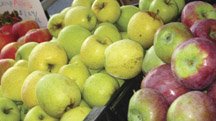By now, everyone knows the argument: Fresh organic fruit and vegetables are among the healthiest foods to eat, but they are often difficult to find and expensive to buy.
Over the years many communities, including Jersey City, have developed various ways to make organic food more accessible. Farmers markets have been one of he most successful models for achieving this goal and Hudson County offers several, including one in Jersey City and another in Hoboken.
Another model that’s had tremendous success elsewhere, the food cooperative, is finally beginning to take root locally.
The farms providing items to the co-op are based in southern New Jersey, New York, and Pennsylvania.
____________
“The Park Slope Food Co-op is mentoring us through this process. The Jersey City Food Co-op is a collectively owned business,” said Co-op President Gillian Allen last week. “In a nutshell, the Jersey City Food Co-op is an initiative to open a grocery store that will sell [products] to its members who have invested their time and their financial resources to building this business. The grocery store will sell naturally-grown food at affordable prices.”
Formed in March 2010, the co-op is on track to open a brick-and-mortar home for itself sometime in 2012. In the meantime, members – whom the co-op calls “owners” – can still purchase fruit, locally farmed vegetables, fruit, meat, milk, and a host of other items. (And by “locally farmed,” the co-op means the items come from farms within a 500 mile radius of Jersey City. The farms providing items are based in southern New Jersey, New York, and Pennsylvania.)
“The whole idea is to keep our money local and to support local enterprise,” said Allen. “Yes, many of us could leave our community and go across the river and get quality food someplace in New York. But our idea is to try to pool our resources here in Jersey City, here in New Jersey. Not only does this support New Jersey farmers and other businesses, but if we pool our resources and work together, it keeps food prices down. That way, naturally grown food will become available for people who maybe can’t afford to go to a Whole Foods.”
How it works
Currently to become an “owner” people can join the co-op for a lifetime investment fee of $50. The co-op currently has around 100 owners, according to Allen, and the group would like to double its numbers by the end of the year. In addition to this investment, co-op owners must also give at least four hours of their time each month to running the business. Anyone can become an owner, whether they’re a Jersey City resident or not.
In exchange for their time and money co-op owners can purchase items online from the Co-op Preshop. The Preshop allows owners to buy groceries and other items before the brick-and-mortar store is opened. Grass-fed, locally-raised meat and poultry, farm-fresh eggs from free-range hens, certified naturally grown fruit and vegetables, and baked goods are among the items that can be bought through the Preshop, according to the co-op’s web site.
The array of items offered are familiar enough to most shoppers that they’d be turned away by uber-exotic choices.
“You can’t bring broccoli rabe when they’re interested in collard greens right now,” said Allen.
The organization has formed relationships with such businesses as Eden Organic, Frontier Natural Food Co-op, Regional Access, a New York state-based distributor, Lancaster Farm Fresh, and Zone Seven, among others, to supply the items available through the Preshop.
Any food ordered online from the Preshop must be paid for and is not covered in the members’ $50 initial investment.
Food orders can be placed on a biweekly basis and can be picked up from the church, also on a bi-weekly basis.
If the cooperative is successful in opening its planned grocery store, owners will eventually be able to do their shopping in-person rather than online.
‘End goal’ still in sight
Allen, however, emphasized that the Preshop is an interim step and opening the retail store next year remains the co-op’s “end goal.”
A member of the Mid-Atlantic Food Co-op Alliance – a group that’s trying to spur more co-ops to open in New Jersey, New York, Virginia, Delaware, Maryland, and Pennsylvania – the Jersey City Food Co-op’s biggest challenge, Allen acknowledges, will be finding a permanent home for the grocery store. But it’s a challenge that, once resolved, Allen believes will ultimately bring Jersey City residents together, no matter where it’s ultimately based.
“Within this city, we have issues with community,” observed Allen who is originally from Brooklyn. “We have these ward lines that separate the ‘upper class’ from the ‘lower class.’ We have some of these issues in New York, too. But I’ve never seen anything as glaring as what was occurring in Jersey City when I moved here is 2001. The idea of a grocery store that’s owned by the people will not only give all of us the pride of ownership, but we believe it will bring people together around an essential need that we all share.”
E-mail E. Assata Wright at awright@hudsonreporter.com.
